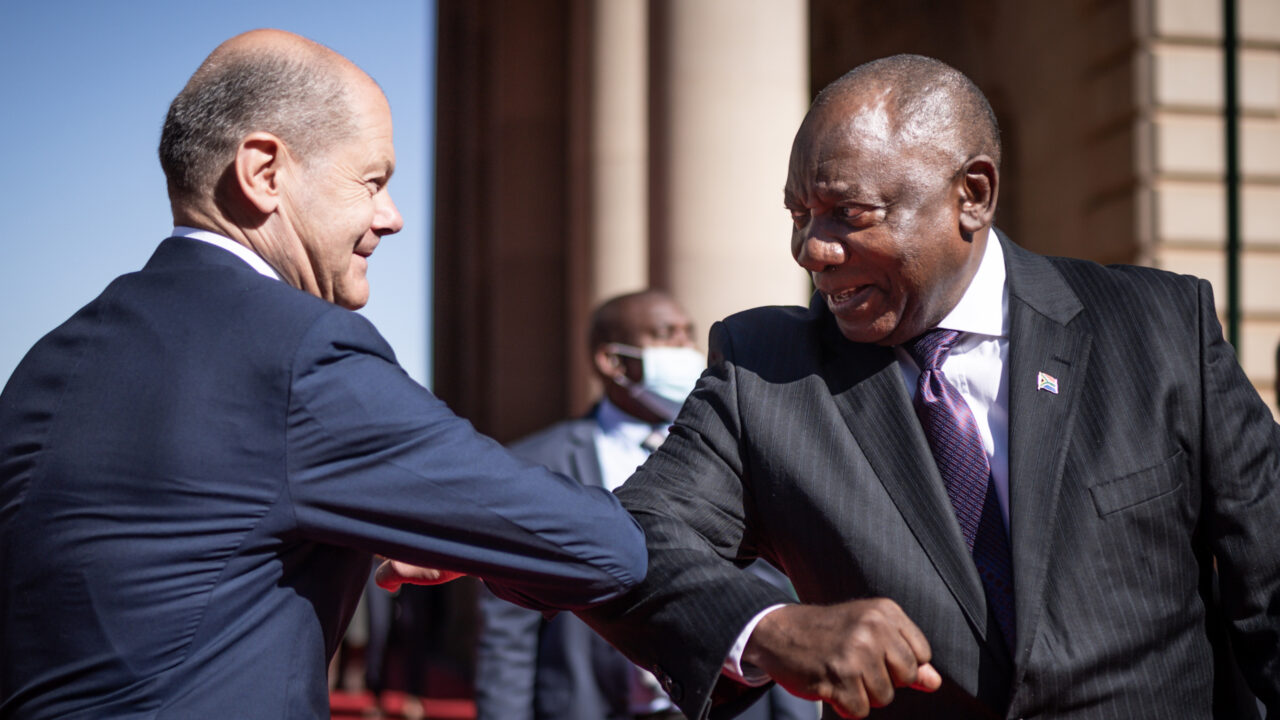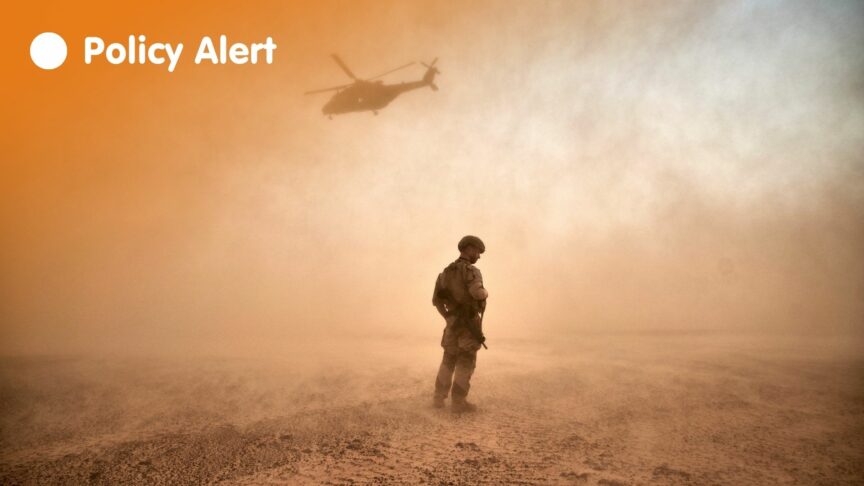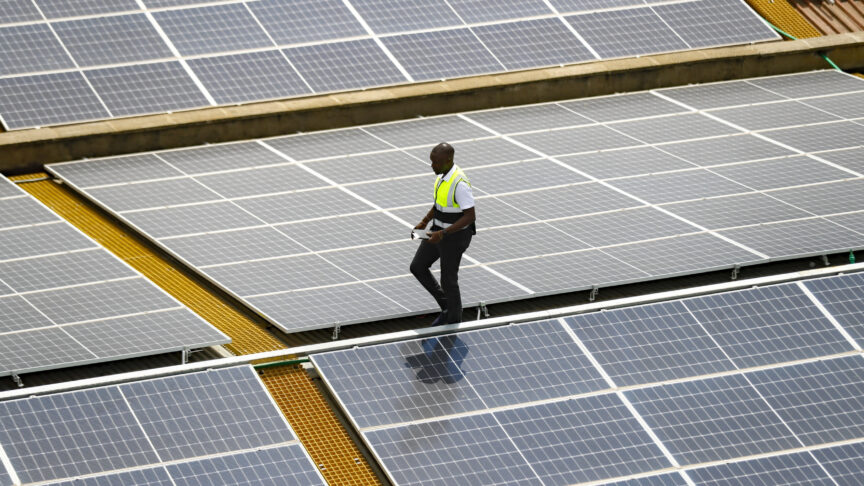Partnership through crisis: The real meaning of Scholz’s Africa trip
Stronger relationships with African states can help Europe address the immediate energy and food crises – and help counter Russian efforts to destabilise both continents
Why is Germany’s chancellor, Olaf Scholz, on a visit to Africa – now, while Ukraine burns? The two issues are more closely connected than they first appear. Africa holds the key to Europe’s economic resilience, especially as Europe continues to decouple from Russia.
Russia’s all-out war on Ukraine is driving Europeans to rapidly reduce their dependence on Russian oil and gas. But Europe’s future energy independence lies not in swapping out Russia’s fossil fuel for a new supplier, but rather in shifting the energy supply goalposts altogether. Renewable energy presents the silver bullet, liberating Europe from fossil fuel dependence while providing a critical stepping-stone on the way to carbon neutrality. From this perspective, the forced decoupling from Russia, while delivering a sharp, short-term shock, is ultimately well within European strategic objectives. But, while renewable energy removes one dependence, it creates others.
Firstly, the green tech needed to generate renewable energy – solar panels, wind turbines, batteries – demands minerals and metals to produce. Russia is a source of some of these materials (such as copper and nickel), while Europe’s systemic rival, China, has actively been working to secure these critical raw and mineral materials (CRM) at source. Africa is not the only CRM source in the world, but the combination of increased demand from Europe’s accelerated transition to renewable energy and the decoupling from Russia as a CRM source (and, potentially, eventually China) mean Africa’s importance for Europe is growing from nice-to-have to decisive.
Secondly, Europe’s renewable energy plan, REPowerEU, counts on Africa being a source of renewable energy for Europe. Europeans are already eyeing green hydrogen, a form of clean gas, as Africa’s next, most important, energy export. Its production requires vast electricity inputs that Africa’s solar power-rich potential might generate.
Finally, there is Africa’s role in bridging Europe’s immediate fossil fuel needs created by the decoupling from Russia. Africa possesses significant reserves of natural gas. Since adequate renewable energy for Europe is not yet available, this means a fossil fuel replacement is unavoidable for the Russian energy it is switching off. Europe needs both oil and gas; but oil is more easily replaced on the global open market than gas. So, it is gas where Europe’s immediate energy fix is most urgent. Gas is typically traded via long-term, large-scale contracts between producers and consumers, which provides security of investment to producers. Excess gas does come up for grabs on the global market, the so-called “spot market”, but it is relatively little in comparison to the long-term contracts. The scarcity-induced price spikes Europe currently faces are in part explained by the fact that existing long-term gas production is already allocated to customers.
So Europe must hold its nose and source gas from places other than Russia, despite this being in contradiction with the green transition. Europe is squaring this circle by distinguishing between the immediate moment and the medium and long term. Right now, an ‘anything goes’ approach has sent European heads of states and ministers off in search of any excess gas capacity. But policy, as articulated at the conclusion of COP26, for the medium term remains – at least for now – to reject any further investment in fossil fuels, banking instead on Europe managing to transition to (near-)full renewable energy.
Africa hosts some of the world’s rare excess gas capacity. Algeria is connected to Spain via a physical gas pipeline, as Russia is to eastern Europe. South-eastern and western Africa have large, not yet fully exploited, reserves, while Egypt and, soon, Senegal already have the reserves and infrastructure to produce liquefied natural gas (LNG), which is exportable and transportable by sea. LNG is particularly critical for Germany and other eastern European countries, which pursued a policy of intentional (inter-)dependence via gas pipelines to Russia rather than diversify their means of supply.
Given this background, Scholz’s stop in Senegal was widely interpreted as another European leader’s hunt for urgently needed gas acquisition. But what it really illustrates is the tension between European climate policy (no new investment in fossil fuel development) and European energy security (tightness in the global gas market and decoupling from Russian gas). Media reports overlooked the fact that Senegal’s gas coming online in 2023 cannot go to Germany even if Scholz wanted it to, as it is already pre-committed to long-term investors in Asia. Were there to be an angle for Germany, it would be in closing a deal for the medium-term development and eventual supply of new Senegalese LNG capacity to Germany. So Africa parsed Scholz’s visit, and in particular the Senegal leg, intently for signs of a shift in European climate policy, which, if it occurred, would add energy security via gas as a third essential bond in the Africa-Europe relationship.
Europe, Africa, and the food crisis
Despite European rhetoric to the contrary, in recent decades the Africa-Europe relationship stagnated in the charity paradigm, rather than being one of partnership. But Europe now really needs a true strategic partnership with African countries to be able to negotiate the energy crisis, address the climate crisis, avert future migration crises, and compete with geopolitical rivals.
Scholz’s announcement on re-establishing grain exports to Africa was not only a humanitarian act of charity but also a smart interest-based decision.
This is why Scholz announced on his tour that Europe would work to re-establish grain exports to Africa. This was not only a humanitarian act of charity but a smart interest-based decision. It cements the Africa-Europe partnership but also counters Russia’s influence.
Africa is far more dependent than most of the world on Russian and Ukrainian food exports: 25 African countries import more than one-third of their wheat from Ukraine and Russia; 15 African countries import more than half. For African economies still reeling from pandemic-induced disruption, the price hikes are a crushing blow. Beyond the agri-food commodities that Russia directly controls, it has multiplied the impact by blocking the export of around 20 million tonnes of Ukrainian grains via the Black Sea. Russia openly advertises its intent to instrumentalise food in service of its geopolitical aims. Food then becomes a Russian currency of influence with dependent African states, while some also claim a bigger game is afoot: weaponising African migration by instigating famine in Africa to stoke migration to Europe. Europe’s dependence on Russia’s oil and gas was one lever of influence; destabilising European societies and, with it, fomenting political strife is another way of sapping at Europe’s resilience in supporting Ukraine.
Scholz’s visit has captured attention across Africa. Follow-through on food security pledges now needs to materialise as proof of Europe’s seriousness and as a means of flanking its pursuit of partnership with Africa in the three areas critical for Europe’s energy security and climate objectives. One way or another, Europe’s evolving needs will compel it into a more strategic relationship with Africa. There is no reason Scholz’s visit cannot be the catalyst.
The European Council on Foreign Relations does not take collective positions. ECFR publications only represent the views of their individual authors.



